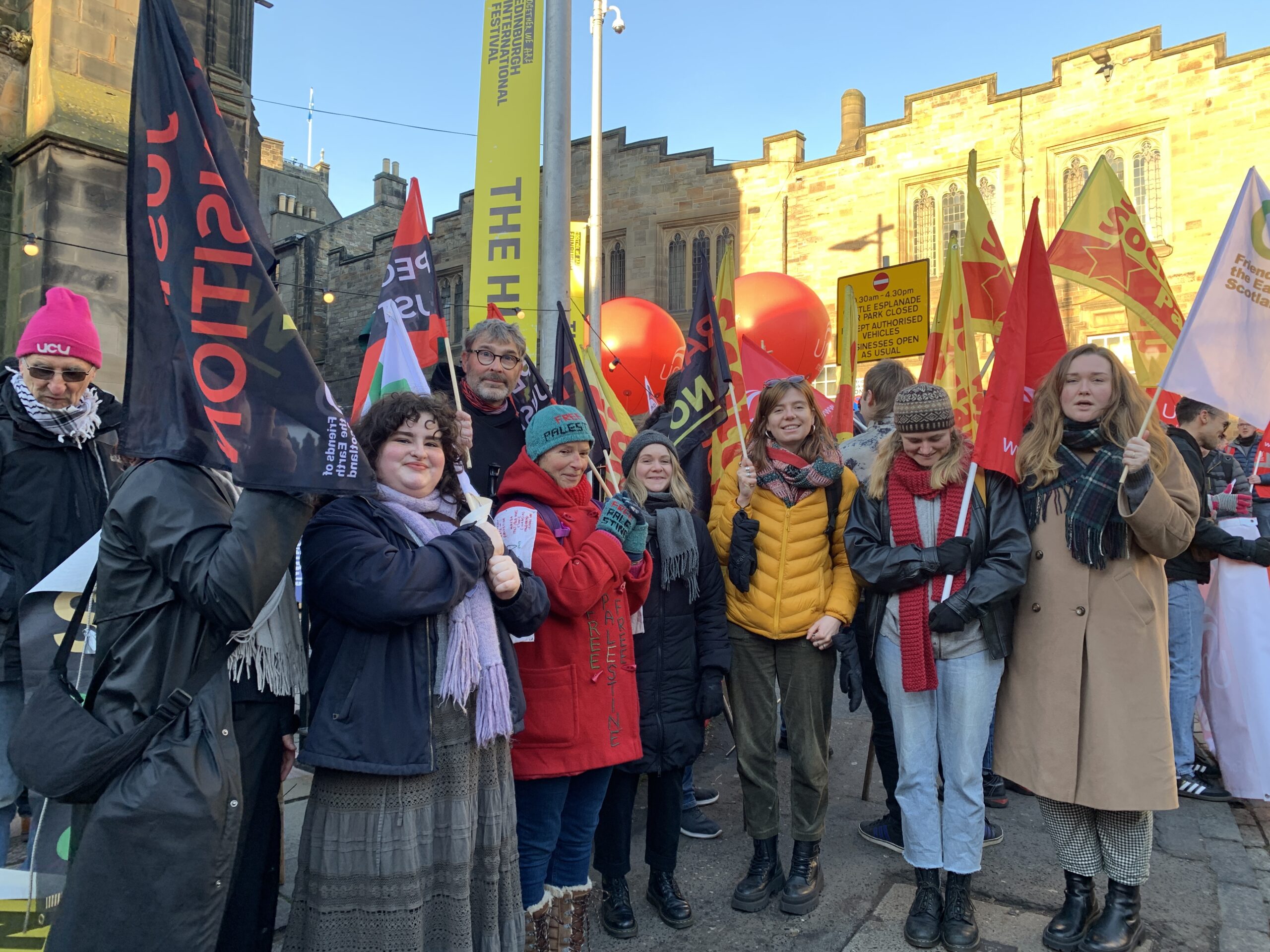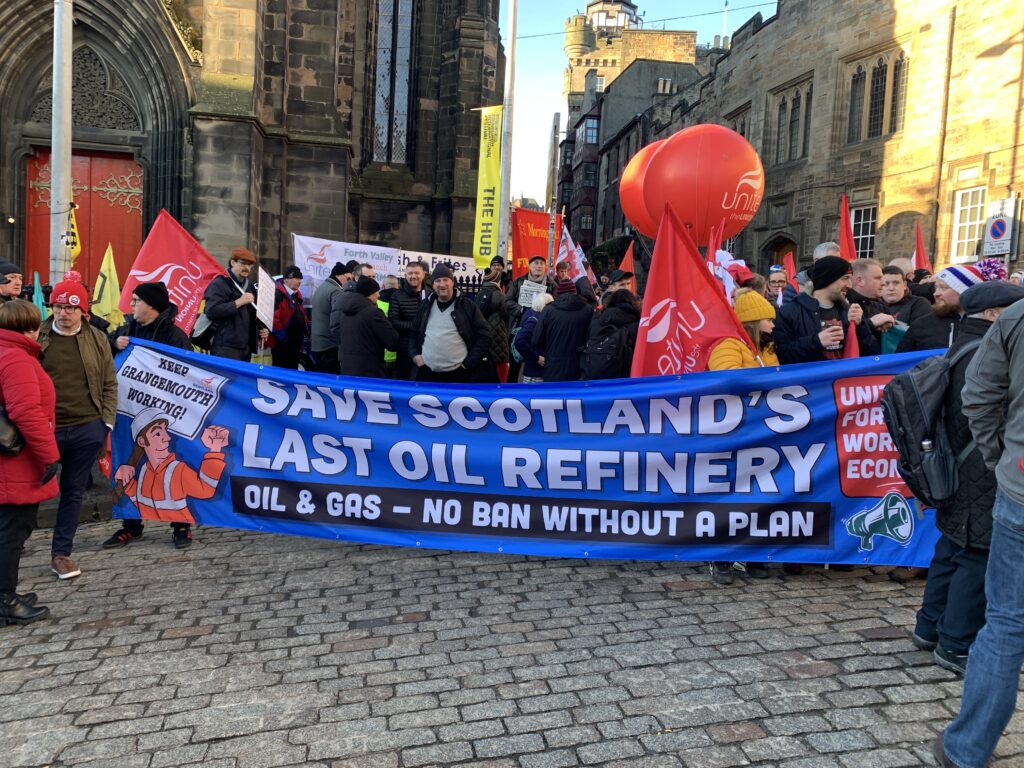
Why climate activists are standing with Grangemouth oil workers
In November 2023, Petroineos announced its plans to convert the Grangemouth oil refinery into an import and export terminal. This decision meant the jobs of 500 workers across the site would be scrapped, in addition to many more across the supply chain and those indirectly employed by the refinery.
Three weeks after this announcement, Petroineos sought to assure the Scottish Government’s Economy and Fair Work committee that there would be “no change” in the product it would sell to its customers. A stark contrast in attitude, considering they had refused to give evidence to the same committee just three months earlier, regarding how they were developing plans for a just transition at the site.
The refinery was one of Scotland’s most polluting sites that year – yet that was not the issue at the heart of Petroineos’ decision-making. It was clear then, as it is now, that it was not the carbon emissions of the refinery that they were concerned with. Petroineos have only ever been concerned with how to maximise their profits, with their workforce and the climate as collateral damage.
The company’s plans epitomize environmental and climate injustice.
Ineos are offshoring pollution
Petroineos are openly offshoring their carbon emissions for someone and somewhere else to deal with, dealing only with a fully refined imported product. At the time of the announcement, this would have been convenient for the Scottish Government too, as its targets only considered the emissions from domestic activities, rather than factoring in the total picture of consumption-based emissions from imported products. Ministers have since scrapped those climate targets entirely.

Nevertheless, this is an intentional blind spot that enables polluters in Scotland like Petroineos to shirk responsibility. And this calculated omission is only increasing in size – Scotland’s carbon ‘blind spot’ has grown from 18 million tonnes of carbon to 30 million tonnes since 1998. The decision to convert the refinery, with no transition plan, is abhorrent on climate, industrial, and moral grounds.
It is hardly surprising that Petroineos has felt emboldened to act with impunity when it comes to the energy transition. The Scottish Government has been conspicuously absent, acting as a powerless stakeholder, feigning frustration over the decisions of private energy companies.
Scottish Ministers knew of closure threat
An unconvincing act in and of itself, it rings particularly hollow considering that the Scottish Government was well aware of the potential closure plans by November 2023. The proposals to shift the refinery to an import and export terminal were first put to Michael Matheson, then Cabinet Secretary for Net Zero, Energy, and Transport, in February 2022 – eighteen months before Petroineos unilaterally announced the plans to the workers and the public. In that time, workers and the community of Grangemouth saw no tangible actions that would reassure them of the future of their jobs or community support.
By contrast, the company have continued to receive public funding and grants from Scottish Enterprise, and from both the UK and Scottish Governments in the form of Project Willow. With no conditionality attached to these grants – on job creation, transition plans, or targeted retraining for Grangemouth workers, for example – Petroineos continues to receive a free pass from both the Scottish and UK governments.
Across Scotland, the market has dictated the pace and the terms of the energy transition. The dearth of any credible just transition plans for any high-carbon industry or supporting community has engendered a feeling of distrust around whether the Scottish Government is up to delivering the task of this generation. This is felt acutely by the workers and community of Grangemouth.
Grangemouth is ‘litmus test’ of just transition
The proposals for the oil refinery, petrochemicals complex, and the wider town itself have been referred to as the ‘litmus test’ of Scotland’s just transition. From this perspective, the picture of Scotland’s just transition from the top down looks bleak. If the Scottish and UK governments sit idly by while Petroineos leaves workers on the scrap heap in Grangemouth, it’ll be no time at all before we see the same happen with other private energy companies across the sector.
But from the grassroots, the fightback against an unjust transition is on. Friends of the Earth Scotland stands in absolute solidarity with the workers organising for their future in Grangemouth and for investment into a robust transition plan with workers and their trade unions at the heart.
Environmental activists must organise against the corporate capture and co-option of the energy transition, exemplified by companies like Petroineos playing fast and loose with the climate and their workers’ livelihoods. We must challenge the narrative that the climate and labour movement are at odds on this issue.
Serious industrial policy and investment is the only way to build a genuinely just transition that secures the futures of workers and the community in Grangemouth and reclaims our energy back from industry cowboys such as Petroineos.
Friends of the Earth Scotland will stand with every march, every rally, and every picket line that workers in Grangemouth organise until we see a fair and rapid transition at the refinery that leaves no worker behind.
Rally to support workers’ calls for a just transition
Unite the Union organised a rally in support of Grangemouth workers in November 2024.
A version of this article appeared in Radical Options for Scotland in Europe magazine.
